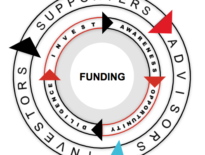
There is a trick to entrepreneurship, to starting a venture, that no one really ever talks about. Not sure why they don’t talk about it… perhaps because they don’t understand how to do it… perhaps because everyone is selling something… perhaps because they’ve hired help and it sucked… regardless, I’m going to let you in a little secret about building a successful startup; the trick is…
Don’t fail.
- Startup Failure Rate And 80+ Other Startling Startup Stats
- Why 90% of Startups Fail, and What to Do About It
- 90% Of Startups Fail: Here’s What You Need To Know About The 10%
- Startup Failure Rate: Ultimate Report + Infographic [2020]
- The Venture Capital Secret – 75% of Startups Fail – Scale Finance
- 90% of Startups Fail: Here Are 4 Expert Tips to Improve Your Odds | Startup Grind
There are so many articles about the fact that 90% of startups fail (I bolded that in case you haven’t heard it enough yet and still didn’t know), that it’s personally aggravating as I get grayer and become that grumpy get-off-my-lawn old man, that there is still all this encouragement to be an entrepreneur and almost no one is writing about, talking about, nor teaching just how to NOT FAIL.
There are even websites dedicated to failed startups!
So here’s the bottom line reality about being an entrepreneur or founder of a startup.
You are going to fail.
Seriously, there is no more sure bet in the world. Think about it… on what else can you possibly actually gamble where you know the likelihood of winning is only 10%??
Play craps in Vegas and you have a better chance of making money.
So why do we do it???
- The payout is better; or rather, can be.
- Personal passion is a seriously undervalued trait that matters; we do it because we *want to*
- Desire to fix or better something; another underappreciated quality of some founders/entrepreneurs – how much is this solution they’re trying to deliver simply an outcome of who they are, personally?
- Preference for how they want to live their life and work. I, for example, just can’t imagine working for an enterprise company.
But still, the key point? YOU ARE GOING TO FAIL
The trick to entrepreneurship is not focusing on how to be successful; because that is literally playing the LONG odds of being one of the 10%. Think about it more, in how many things about yourself are you the top 10% of the world? Seriously, no one sane does something because they’re sure they’re going to be in the 10%
The trick to entrepreneurship is focusing on what prevents failing from happening.
Thus, a great question: Why is competitive analysis important to an entrepreneur?
Take a look at this.Paul Graham’s assessment of the mistakes that kill startups
#s – 2, 3, 4, 5, 7, 8, 9, 10, 11, 12, 13, 14, and 15 are all MARKET related issues.
Seriously, read it closely. So… what would any sane entrepreneur do? Knowing you have a 90% chance of failing, why would you make any investment in doing anything other than avoiding these 18 things?!
Here’s the study Carnegie Mellon’s Chandni Motwani did for Chubby Brain
Reasons 1, 2, 4… the top reasons: market related.
And one could argue that since 1, 2, and 4 are Market related, #3 (not the right team) is in fact because that team didn’t prioritize, understand, or include doing the Marketing to NOT screw up customers, market need, or what team you need.
For crying out loud, #4 literally just says crappy marketing.
Go down the list though, 1, 2, [3], 4, 5, 6, 7, 8, 9, 10, 11, 16, 17, and 20. Wow.
Let’s do it again, here’s CB Insights with Statista
#1 No Market Need.
1, 2, 4, 5, 6, 7, 8 (actually says “poor marketing” too), 9, 10, 13, 15, 20
Seeing the pattern?
Seeing why I’m increasingly grumpy old man aggravated?
The reasons startups fail is VERY well known. And yet, everyone is fixated on “do this,” “do that,” MVP, hire me, get validation, raise money.
What is a Competitive Analysis?
A competitive analysis is one of the primary ways that we study the market. That we do what avoids 1, 2, 4, 5, 6, 7, 8, 9, 10, 13, 15, 20
A competitive analysis is to determine the strengths and weaknesses of the competitors within your market, strategies that will provide you with a distinct advantage, the barriers that can be developed in order to prevent competition from entering your market, and any weaknesses that can be exploited.
The worst thing you could be is one of those founders or entrepreneurs who says, “we don’t have any competitors.”
Let me add one more getting grumpier old man statement: YOU HAVE COMPETITORS. No one in the history of my family tree traced back to the 1700s in Ireland has ever been able to say they don’t have competitors.
What causes you to fail? Aside from the many many things listed above? Simply: competitors who do what you are doing cheaper, better, or faster.
So why on earth would you start ANYTHING or invest in building ANYTHING if you haven’t yet determined that you won’t fail because of them?
What you’re usually looking into is 7 things:
- What they offer and how (the product or service)
- Where they provide it and why there (distribution)
- How the monetize it and the model for that (pricing)
- What kind of capital and partners are they working with (resources)
- Who is on the team (people)
- How do they promote it and why that way (promotion)
- What sort of advertising are they doing (advertising)
Your goal?
To… not run out of cash… to not have the wrong team … to not have poor marketing or a poor product … not choose the wrong location or platform.
To NOT fail by NOT doing what they’re doing well and by finding the competitive advantage you could develop by being better at that than they are.
I want to invite you to join me in such discussions live and together.
Join me online here





Startup founders and business leaders need to have a high level of situational awareness if they want to have a chance at becoming successful.
Well, at least to people like me, it’s not a “trick.” Having a good understanding of the competitive landscape gives the entrepreneur the best picture of whether their “BIG” idea has merit. Having done a “few” of these over the last 45 years, especially in the last 15 or so in “technology”, taking a good look at the patent landscape is also a part of the competitive review.
JMO of course.
And this is why I value you, you say it like it is, thanks for #keepingitreal!
Thank you Smriti Agrawal Zaneveld!
Indeed Jay Fraser, it’s not a trick; easy turn of the phrase to help people realize that it’s the different approach than most take. It’s “magic” but hey look at this… it’s really NOT magic 🙂
Agree. Funny how a number of conversations include the statement “we have no competitors”.
Terrific article, Paul! Much appreciated
100% spot on! Thank you!!!
I thoroughly enjoyed the embracing of your grumpy-old-man-ness.
Awesome, I look forward to getting older LOL
Of course, Paul, it isn’t magic either. It takes someone with experience to understand the intricacies of a competitive analysis and then landscaping (as for understanding the patent landscape of “what is possible,” that takes experience with patents etc.). Fortunately for me, I’ve been doing competitive analyses since my days on Madison Ave, and then carried forward to the last 30 years since becoming involved with technology.
There’s so much more to it.
Cool post, Paul! Made some notes! In my experience, competitors are what “your” customers are using because, a) that product may be a lot worse than yours but the customer can use it a lot better than they can use your innovative-but-arcane product, b) it’s highly integrated into their existing workflows, and getting people to change workflows is tough – people with bad postures don’t sit up straight even after the bulging disc happens, c) customers don’t trust a new player with anything that’s business critical, so you will have to work your way in with non-critical side projects. Re: failure, I think 90% of startups fail because 75% of people who go to work in startups just should not. Startups are Navy Seals stuff and most people just want to guard a base.
100%
Great analogy and some stories to tell in that idea of Startups being Navy Seals Paul Robert Cary
Really interesting article, Paul! Would love to hear specific examples from your own experience as well!
This was a great read. I’m in the process of launching a product so definitely took some of those tips to heart
Ya ya, but my company is so unique it’s never been done before. ?
“by me” is always a great caveat to add to make something true 😛
Paul, that’s always true. In my case, while I’ve “done this” before, my co-founder has not (this remains an issue being dealt with almost daily). But what hasn’t been done before is our material that is quite unique (this remains a hurdle since even though we’ve gone way past the so-called “MVP” the goal line keeps being moved back.
Exiting the “valley of death” is not a trivial matter.
Thanks for sharing. Great insight. I would add that competitive analysis goes beyond just the marketing/sales/technology. It cuts deep. For example, you can do the same thing they are doing but if you know they have a hiring issue you can solve by fostering a better culture, even that can be an advantage.
Sounds like a wonderful point related to an article I have drafted and a panel discussion coming up in a couple weeks. cc Dave Lawson
The rules of starting a business….
Rule #1… don’t die!
Rule #2 … don’t forget rule #1.
Rule #3… there are no other rules!
Ever been in the clickfunnels community?
Trey Carmichael the blind leading the blind (not always of course)
Natalie Rose big facts. More just because he said competitive analysis isn’t talked about.
No, but I’m intrigued. Why so?
Paul O’Brien because competitive analysis was one of the first things I ever learned and it was in that community.
Crazy to realize how few people don’t get it now.
Trey Carmichael awesome, thank you for clarifying.
And yep… whenever I hear a founder say they have no competitors or inquire who they are and their list is incredibly limited (or only mentions other startups), you can immediately tell that they’re going to fail.
Paul O’Brien big facts
A mentor told me the No. 1 rule of business: Stay In Business.
Sounds familiar: https://seobrien.com/startups-when-to-quit 🙂
Very well said Paul O’Brien. I d like to add value saying… For the few that are able to create a real competitive advantage, be sure that services/products that make the difference from competitors are valuable for consumers. Good luck to you all. See you in the arena ?
The reasons businesses fail are often complex and nuanced, but the reasons they succeed might be due to literally just a single fortuitous they did. So the different between success and total failure could come down to: A single experiment, a single hire/founder, a single feature, a single marketing effort. So, all anyone can really do is to keep trying new things and to keep on learning.
Used to be expected as part of your initial business plan especially by VC’s to understand competitive analysis. Seems to have gone away these days.
I tend to see that what’s gone away is the prioritization of the marketing focus to DO that… or the understanding of what marketing actually is so that it’s done.
Yes!
Validation
Analysis
Markit fit
Traction
Term sheets signed
Thanks Paul! Definitely helped along the way @_SocialSX is on the way.
So TRUE! Founders need to be experts on their enemies! Great read.
Cheers Kirk Coburn, I’m increasingly finding it so, and we’re doubling the time spent on competition, in our incubators
Great post for startup founders.
Thank you for the insightful article. Many entrepreneurs miss this step and it is a great mistake. The first thing you need to do before starting your own business is to determine your strengths and competitors’ weaknesses. The result of this analysis is a key point in building your product’s strategy, it is extremely important.
Perhaps market definition and then competitive analysis?
perhaps. In my experience, too many founders try to define that market, or their customer, before doing the work to figure out if their assumption is correct.
So important… Understand market, product, investor appetite, Messaging, what customer’s are using and how satisfied/ sticky existing offerings are. Annnnd what came before you, what you’re disrupting, etc. etc. Etc.
[…] startup because of what you’ve already defined to be the customers. That won’t tell you how to differentiate from competitors, how to price your product, how to build partnerships, or how to position your brand. It won’t […]
[…] defining a customer profile, analyzing competitors, and understanding macroeconomic trends. Competitive analysis, for example, reveals whether there is a gap in the market and whether the market has a gap for […]
[…] To do that, every new endeavor (business, startup, project, or creative work), should start with a competitive analysis before doing much of anything else. I’ve shared a thought about how and why here. […]